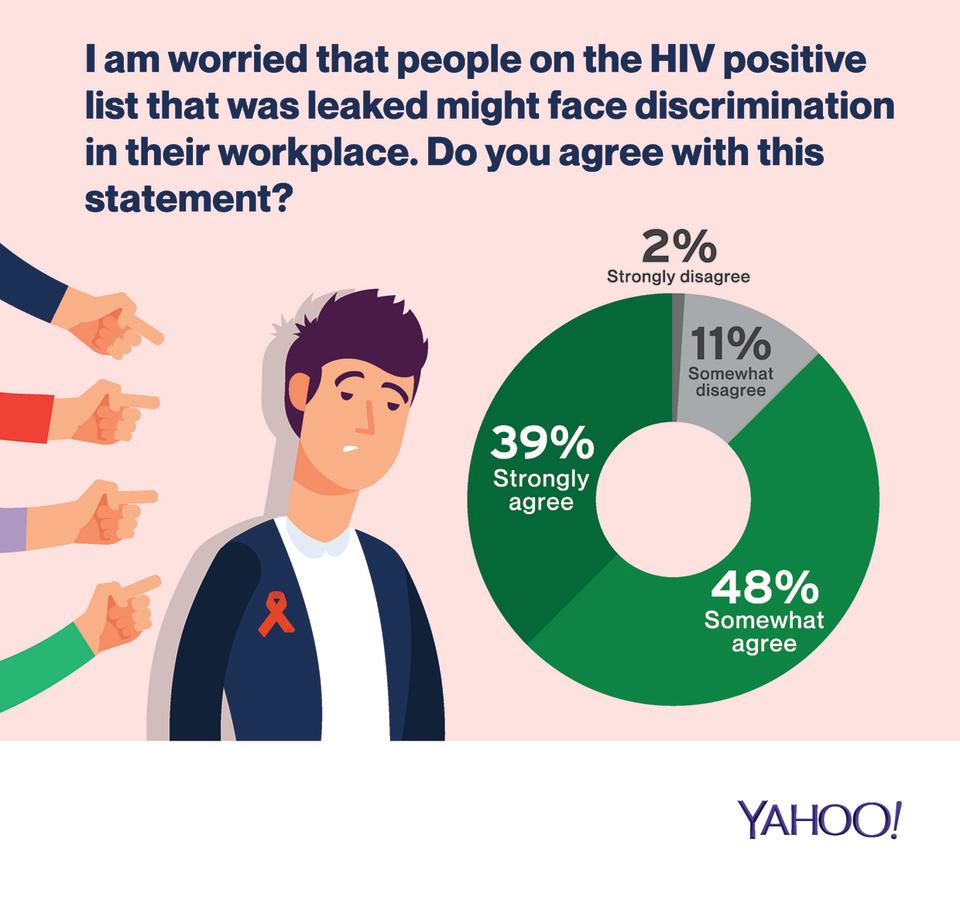More than 90% of Singaporeans say HIV registry should stay: poll

Over 90 per cent of Singaporeans feel that the Republic should continue to have a compulsory HIV registry for contact-tracing purposes, according to findings from an online survey commissioned by Yahoo News Singapore.
39 per cent of 908 Singaporeans polled “strongly” agreed with having a HIV (human immunodeficiency virus) registry for Singapore, while 52 per cent “somewhat” agreed. Only 2 per cent “strongly” disagreed.
The survey was conducted by market research consultancy Blackbox Research from 14 to 26 February, less than a month after the Ministry of Health (MOH) made known to the public about the online leak of confidential data belonging to 14,200 HIV-positive individuals and 2,400 others who were identified through contact tracing.
The leaked data from the HIV registry included the affected individuals’ names, identification numbers, contact details, HIV test results, and related medical information.
An American conman, Mikhy K Farrera Brochez, was identified as the culprit behind the HIV, or human immunodeficiency virus, registry leak.
The 34-year-old’s Singaporean partner, Ler Teck Siang, who headed the MOH’s National Public Health Unit (NPHU) from March 2012 to May 2013, was authorised to access information in the HIV registry.
Brochez later alleged on Facebook and in a media interview last month that the HIV registry was used to target gay men. The MOH had called these allegations “untrue“.

While they expressed strong support for the registry, an overwhelming majority of respondents were also concerned about workplace discrimination for the affected HIV-positive persons.
87 per cent of respondents “strongly” or “somewhat” agreed with the statement: “I’m worried that people on the HIV-positive list that was leaked might face discrimination in their workplace.”
This is despite 55 per cent “strongly” or “somewhat” agreeing that HIV-positive people in Singapore are generally not discriminated against.
67 per cent also “strongly” or “somewhat” agreed that the social stigma associated with HIV has reduced significantly with better public understanding of the disease.
Minister for Health Gan Kim Yong in Parliament had on 12 February said that some patients who are affected by the HIV registry leak have reported to medical social workers about feeling suicidal.
In the aftermath of the leak, groups such as LGBT (lesbian, gay, bisexual and transgender) advocacy group Pink Dot SG had called for the introduction of anti-discrimination legislation to support HIV-positive individuals.
The survey respondents were evenly split between men and women, with those aged 50 years and above being the biggest group at 38 per cent.
78 per cent were Chinese, 14 per cent were Malay, 7 per cent were Indian, while the remaining 12 per cent were of other ethnic origins.
The same respondents were also surveyed on:
– the transparency of the Singapore Armed Forces in reporting training-related casualties
– length of national service period
– level of government protection for personal data
Related Singapore stories:
HIV data leak: ‘Mikhy Brochez’ Facebook account removed for violating user policies


